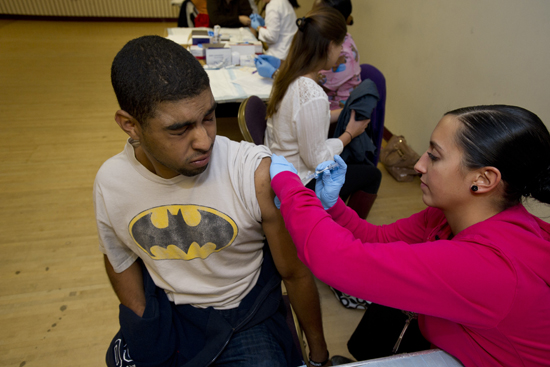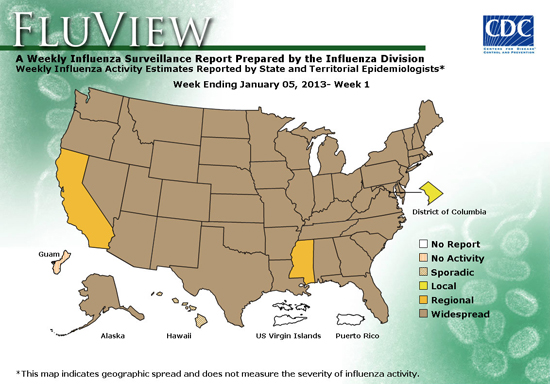What to Do about the Flu
Bad influenza season: prevention, treatment, vaccine clinics

Gina Sinacola, a registered nurse at Brigham and Women’s Hospital, administers a flu shot to Marc Levi (CAS’13) at the GSU. Photo by Vernon Doucette
You can still get a flu shot. And for God’s sake, don’t come to class or a dining hall if you’re sick.
Those and related reminders were emailed to the BU community last week from Student Health Services (SHS) amid a nationwide flu outbreak that’s killed at least 18 in Massachusetts and led Boston to declare a flu emergency.
The good news, according to flu experts, is that this year’s flu vaccine is effective against the new bug. The University has scheduled flu clinics this week for students at the George Sherman Union and FitRec, and for faculty and staff on the Medical Campus and on the Charles River Campus at the Occupational Health Center, 930 Commonwealth Ave., via its Pleasant Street entrance (details below).
“Student Health Services has begun to see some limited influenza activity over the past several weeks,” SHS director David McBride said in his message to the University community. “This news is no cause for alarm, but it does give us all the opportunity to practice effective prevention of this type of illness.”
McBride had previously alerted the BU community to the ineffectiveness of antibiotics in treating the flu. Among his latest email’s suggestions, besides getting a vaccine shot:
- Wash your hands frequently. To assist, the University has almost 500 hand sanitizer stations in academic, residential, and recreational buildings.
- Avoid those who have the flu if possible. Those who catch the flu should get bed rest and avoid crowded places, from classrooms to FitRec to dining halls. Dining Services allows stricken students to reserve meals online for pickup and delivery by friends. McBride recommends that those with the flu isolate themselves until they’ve been fever-free for 24 hours after they’ve stopped taking fever medication.
- Clean frequently touched surfaces in your room or office with Clorox wipes or another antibacterial cleanser.
- Cough into your sleeve or a tissue, not your hands.
- Ill or healthy, don’t touch your face, as it spreads germs.
- If you get the flu, drink lots of fluids, and if you have a fever, take fever medicine such as acetaminophen (Tylenol), ibuprofen (Advil), or naproxen (Aleve). If taking the fever medicine for three days doesn’t fix the fever, seek medical care, which should also be sought if you persistently vomit up fluids. Students can call SHS at 617-353-3575 with any questions.
- People with additional, significant medical problems should call SHS or their doctor early after getting the flu.
The University encourages students to contact their professors if they’ll be out of class to arrange catching up on missed studies.
BU’s Custodial Operations has prevention protocols for flu and flu-like illnesses, calling for such things as “more rigorous use of protective gloves and goggles,” frequent hand-washing, and increased cleaning of the array of frequently touched surfaces in campus buildings, along with the extra service hours necessary to do this work.

The federal Centers for Disease Control says exact numbers of annual flu deaths are unknown—for one thing, states aren’t required to report them—but that in the last three decades, they’ve ranged from approximately 3,000 to 49,000.
Upcoming flu clinics on the Charles River Campus and the Medical Campus are as follows:
- Friday, January 18, 10 a.m. to 4 p.m., FitRec Dance Studio lobby (enter via Buick Street) (students only)
- Friday, January 18, 9 to 11 a.m. and 2 to 4 p.m., Occupational Health Center, 930 Commonwealth Ave. (employees only)
- Tuesday, January 22, 9:30 a.m. to 3:30 p.m., Medical Campus, Hiebert Lounge, 72 E. Concord St. (students only)
No appointments are needed, but bring your student ID. Flu shots are free for students with BU’s AETNA student health insurance; if you have your own insurance, SHS will give you a receipt to seek reimbursement (most insurance companies cover flu shots). Students without insurance will have their student accounts charged $30 for a shot. You should not get a flu shot if you’re allergic to eggs, have had a severe reaction to a previous flu shot, are moderately or severely ill, or have developed Guillain-Barre syndrome within six weeks of getting a previous flu shot.

Comments & Discussion
Boston University moderates comments to facilitate an informed, substantive, civil conversation. Abusive, profane, self-promotional, misleading, incoherent or off-topic comments will be rejected. Moderators are staffed during regular business hours (EST) and can only accept comments written in English. Statistics or facts must include a citation or a link to the citation.